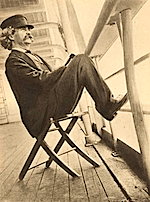By LAURA BARTON [Intelligent Life] – It is evening, midweek and out of season, and the streets of Hannibal are quiet except for the workmen restoring Becky Thatcher’s house and the chirping of crickets. A handful of teenagers cluster near the Twain Museum, where a sign advises: “America’s Official Tom Sawyer and Becky Thatcher appear here every Friday and Saturday at 11:30am, Sunday 1pm.” The air is still warm, but the light casts cool, sharp shadows on the path down to the riverbank and splays itself in great burnished ripples across the river.
Here, 700 miles from the headwaters, the Mississippi stretches three-fifths of a mile wide, far across to the dark, wooded banks of Illinois. It runs north into Iowa and south to Kentucky, but right on this particular curve the river lies deep and silty, its banks rich with black walnut, maple and hickory trees, and the water itself, dappling blue and gold and olive-green. Standing here, I agree with Twain, who called this view “one of the most beautiful on the Mississippi.”
Last autumn, in an effort to get to know Twain a little better, I decided to trace the Mississippi from its beginning in northern Minnesota to its conclusion at the Gulf of Mexico, driving the Great River Road through ten states and taking in some of the sites most significant to Twain. It was an idea that both thrilled and worried me; I feared that, viewed close-up, these places could never hope to match their literary incarnations, and I kept in mind a line from “Old Glory,” Jonathan Raban’s account of his own journey down the river: “It is called the Mississippi, but it is more an imaginary river than a real one.”
It had been shaped in my own imagination by a confederacy of literature and song lyrics. I pictured it as described by Twain, or Eudora Welty, or William Faulkner, who saw “alluvial swamps threaded by black, almost motionless bayous and impenetrable with cane and buckvine and cypress and ash and oak and gum.” I imagined it as it was conjured up by Paul Robeson in “Ol’ Man River”, or in the songs of Johnny Cash or Charlie Patton, a mighty force capable of carrying away the one you loved, of breaking levees and washing the lowlands of Greenville and Leland and Rosedale, and I saw the delta through Paul Simon’s eyes, “shining like the national guitar.”
Continued at Intelligent Life | More Chronicle & Notices.






















Post a Comment